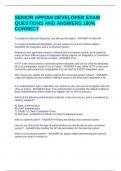Exam (elaborations)
SENIOR APPIAN DEVELOPER EXAM QUESTIONS AND ANSWERS 100% CORRECT
- Course
- Institution
SENIOR APPIAN DEVELOPER EXAM QUESTIONS AND ANSWERS 100% CORRECT SENIOR APPIAN DEVELOPER EXAM QUESTIONS AND ANSWERS 100% CORRECT SENIOR APPIAN DEVELOPER EXAM QUESTIONS AND ANSWERS 100% CORRECT To create an Inbound Integration, you will use this object - ANSWER-A Web API To create an Outb...
[Show more]



